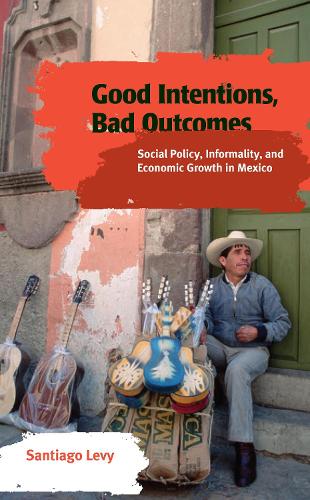
Good Intentions, Bad Outcomes: Social Policy, Informality, and Economic Growth in Mexico
(Paperback)
Publishing Details
Good Intentions, Bad Outcomes: Social Policy, Informality, and Economic Growth in Mexico
By (Author) Santiago Levy
Bloomsbury Publishing PLC
Brookings Institution
6th May 2008
United States
Classifications
Professional and Scholarly
Non Fiction
331.10972
Physical Properties
Paperback
372
Width 156mm, Height 236mm, Spine 23mm
644g
Description
"
Despite various reform efforts, Mexico has experienced economic stability but little growth. Today more than half of all Mexican workers are employed informally, and one out of every four is poor. Good Intentions, Bad Outcomes argues that incoherent social programs significantly contribute to this state of affairs and it suggests reforms to improve the situation. Over the past decade, Mexico has channeled an increasing number of resources into subsidizing the creation of low-productivity, informal jobs. These social programs have hampered growth, fostered illegality, and provided erratic protection to workers, trapping many in poverty. Informality has boxed Mexico into a dilemma: provide benefits to informal workers at the expense of lower growth and reduced productivity or leave millions of workers without benefits. Former finance official Santiago Levy proposes how to convert the existing system of social security for formal workers into universal social entitlements. He advocates eliminating wage-based social security contributions and raising consumption taxes on higher-income households to simultaneously increase the rate of growth of GDP, reduce inequality, and improve benefits for workers. Go od Intentions, Bad Outcomes considers whether Mexico can build on the success of Progresa-Oportunidades, a targeted poverty alleviation program that originated in Mexico and has been replicated in over 25 countries as well as in New York City. It sets forth a plan to reform social and economic policy, an essential element of a more equitable and sustainable development strategy for Mexico.
"Reviews
"Santiago Levy demonstrates how important it is that we consider the systemic implications of individual actions when designing economic and social policies. His comprehensive analytical framework, his thorough interpretation of an unusual data set, and his acute sense of how real people behave combine to make for a fascinating and constructive critique of Mexico's social protection system that would also apply to several other emerging economies." Franois Bourguignon, Director, Paris School of Economics
|"Santiago Levy makes a compelling case for the reform of the Mexican social protection system. He provides a brilliant in-depth analysis of the shortcomings of the current approach that fails to achieve the basic goal of protecting those in need and also seriously harms Mexico's growth prospects." James D. Wolfensohn, former president of the World Bank
|"The central thesis of this monograph is that the way Mexico's social programs are structured vis--vis the labor market is inequitable and inefficient. This excellent book argues that such programs, which the author strongly supports, should be delivered in a manner that does not discriminate between different types of employment arrangements. Benefits should be financed with general taxes, not employment-specific contributions by firms and workers. It will become a standard reference in the development literature because although the focus of the study is Mexico, the issues considered are faced by most developing countries, in Latin America and beyond." Ravi Kanbur, T. H. Lee Professor of World Affairs and Professor of Economics, Cornell University
|"This is a rare study linking misguided social programs to low productivity and wages and disappointing growth in Mexico. Clear, compelling, and worrying, justifying a bold policy prescription, from an author who knows his economics, his politics, and his Mexico." Nancy Birdsall, President, Center for Global Development
|"Levy presents an insightful analysis of Mexican social policy. This rare book combines the familiarity and impressive knowledge of one of the main architects of this policy with the type of critique more often provided by outsiders." CHOICE
Author Bio
Santiago Levy is former general director of the Mexican Social Security Institute. From 1994 to 2000, he served as deputy minister of finance in Mexico and was the main architect of the Progresa-Oportunidades program.
